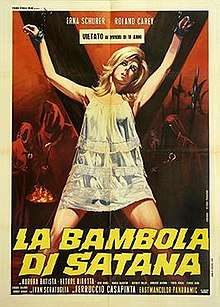La bambola di Satana
| La bambola di Satana | |
|---|---|
 Italian film poster | |
| Directed by | Ferruccio Casapinta[1] |
| Screenplay by |
|
| Story by | Ferruccio Casapinta[1] |
| Starring |
|
| Music by | Franco Potenza[1] |
| Cinematography | Francesco Attenni[1] |
| Edited by | Franco Attenni[1] |
Production companies |
Cinediorama[1] |
| Distributed by | Paris Etoile |
Release date |
|
Running time | 90 minutes[1] |
| Country | Italy[1] |
| Box office | ₤118 million |
La bambola di Satana (lit. Satan's Doll) is a 1969 Italian gothic horror film written and directed by Ferruccio Casapinta.[2]
Plot
When her uncle dies, Elisabeth goes back to her family's castle to hear the reading of his will. Her boyfriend Jack suspects there is a plot afoot to steal Elisabeth's inheritance and keeps a close eye on her. She learns the castle is said to be haunted, and her relatives try to get her to sell it cheaply, but she hesitates. Later she is kidnapped and brought to a dungeon where she is tortured by a hooded figure.
Cast
- Erna Schurer (as Elisabeth)
- Roland Carey (as Jack)
- Aurora Battista
- Ettore Ribotta
- Manlio Salvatori
- Franco Daddi
- Lucie Bomez
- Beverly Fuller
- Eugenio Galadini
- Giorgio Gennari
- Domenico Ravenna [2]
Production
La bambola di Satana was Ferruccio Casapinta only film where he was credited as a director.[1] Emma Costantino described the production as a "troubled shoot", stating that Ferruccio Casapinta's assistant director was the person who "did everything on set" and that Casapinta "was an idiot who couldn't do anything."[3]
La bambola di Satana was filmed at Castle Borghese in Pomezia, Pratica di Mare and in Abruzzo.[1][4]
Release
La bambola di Satana was released in Italy on June 12, 1969 where it was distributed by Cinediorama.[1] It grossed a total of 118,009,000 Italian lire on its theatrical release.[1] The film was never dubbed into English and did not receive a theatrical release in the United States.[2]
Reception
Roberto Curti, author of Italian Gothic Horror Films, 1957–1969 stated that Ferruccio Casapinta "shows no directorial flair at all."[5] and that for a gothic film, it "looks awful."[5] The review noted that editing was poor, with night and day shots alternating within the same scene and that the special effects were terrible noting the thunderstorms and pink clouds that surround the castle.[5] Curti concluded that the film was an "obscure— and deservedly so— addition to the Gothic genre"[1] Louis Paul, author of Italian Horror Film Directors stated that the film is"certainly rooted within the classic gothic atmosphere of early Italian horrors, but the addition of considerable nudity and a black-gloved killer clearly places La bambola at the cusp of the new age. It is an indication of the changing aspects of the Italian horror film to come."[6][7] AllMovie gave the film a three and a half star out of five rating, finding that the film "benefits from a slicker look and a better sense of humor." and that "It all seems a bit overwrought, but fans of Italian horror don't come to it for subtlety. Indeed, the nearly operatic histrionics on display are immensely enjoyable, for their camp value if nothing else."[8]
See also
Footnotes
- 1 2 3 4 5 6 7 8 9 10 11 12 13 14 Curti 2015, p. 192.
- 1 2 3 Luther-Smith 1999, p. 3.
- ↑ Pulici, Davide (June 2007). "Le sorelle di Venere 2,". Nocturno Dossier (in Italian). Vol. 59. p. 32.
- ↑ Curti 2015, p. 194.
- 1 2 3 Curti 2015, p. 193.
- ↑ Paul 2005, p. 24.
- ↑ Paul 2005, p. 25.
- ↑ Firsching, Robert. "La Bambola di Satana". AllMovie. Retrieved January 19, 2016.
References
- Curti, Roberto (2015). Italian Gothic Horror Films, 1957–1969. McFarland. ISBN 978-1-4766-1989-7.
- Luther-Smith, Adrian (1999). Blood and Black Lace: The Definitive Guide to Italian Sex and Horror Movies. Stray Cat Publishing Ltd. ISBN 0-9533261-1-X.
- Paul, Louis (2005). Italian Horror Film Directors. McFarland. ISBN 978-0-7864-8749-3.